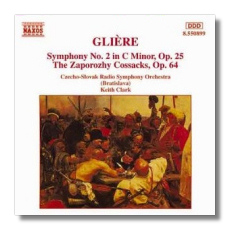
The Internet's Premier Classical Music Source
Related Links
- Glière Reviews
- Latest Reviews
- More Reviews
-
By Composer
-
Collections
DVD & Blu-ray
Books
Concert Reviews
Articles/Interviews
Software
Audio
Search Amazon
Recommended Links
Site News
 CD Review
CD Review
Reinhold Glière

Symphony #2
- Symphony #2 Op. 25 (1908)
- Symphonic Poem "Zaporozhye Cossacks" Op. 64 (1921)
Czechoslovak Radio Symphony Orchestra/Keith Clark
Naxos 8.550899 - 66min
The Russian musical scene changed considerably in the nine years that separate Reinhold Glière's first two symphonies. By 1908, when the Second was completed, revolution was clearly in the air – both politically and musically. Strange harmonies, brilliant colors, and fevered eroticism permeated the latest efforts of Alexander Scriabin. (Glière tried his hand at imitating Scriabin's style in 'Sirens', a symphonic poem dating from the same year as his 2nd Symphony.) The wild-eyed "bad boy of Russian music", Serge Prokofieff, was beginning to shock conservative Russians with the first public performances of his diabolical new piano pieces. And the work of two radical foreigners, Jean Sibelius and Richard Strauss, was starting to appear regularly on Russian concert programs.
The tense atmosphere of the opening of the battle sequence from 'Ein Heldenleben' and the epic sweep of Sibelius's early orchestral works can be clearly discerned in the first movement of the Glière Second. Despite these non-Russian influences, the music is also strongly nationalistic. Glière still owes a considerable debt to Rimsky-Korsakov, but now there are also hints of Rachmaninoff, who completed his own Second Symphony the year before Glière's. The thematic material of the opening movement is bold, striking, and full of pent-up energy – a distinct improvement over the lackluster ideas of Glière's First. The development is dramatic and explosive, as fragments of the principal theme are tossed about by the various orchestral choirs. The insistent repetitions of this theme eventually become tiresome in maestro Clark's hands. Zdeněk Macal's fire and exuberance (on Delos, with the glorious New Jersey Symphony) are preferable to Clark's blandness and restraint. II is a vigorous and lively scherzo. Glière lifted the noble melody of the central section almost without modification from the finale of Rachmaninoff's popular Second Piano Concerto. Later, America's Tin Pan Alley would use the same theme for a pop song called "Full Moon and Empty Arms". A poignant and tender aria, initially sung by the English horn, is the subject of a series of colorful variations in III. Again it is Macal who is most effective at conveying the majesty, beauty, and vivid contrasts inherent in this music. The joyous and richly varied finale has an exotic, oriental atmosphere, and the brilliant scoring is worthy of Rimsky-Korsakov at his best. There's an especially striking oboe solo at about 3:30 that Moussorgsky would have been proud to put his name to. Clark's reading is typically episodic and stodgy. Macal, on the other hand, achieves precisely the right balance between fantasy and fire.
Glière composed this symphony for a phenomenally talented young double bass virtuoso named Serge Alexandrovich Koussevitzky, who was about to embark on a new career as a conductor. It's a stunning portrait of this volatile and intense musician, who soon became one of the century's greatest conductors and a tireless champion of the newest and best music of his time. Koussevitzky led the première of Glière's Second as a part of his very first appearance as a conductor during a memorable concert of the Berlin Philharmonic on January 23, 1908.
The work that fills out this Naxos program, "The Zaporozhy Cossacks", is more rhapsody than symphonic poem. The fierce independence of the Zaporozhys – who roamed the Ukraine in the 17th century – is conveyed through a series of colorful, if rather repetitious episodes, culminating in a lively succession of peasant dances. Clark is predictably staid in the first portion of the work but comes to life when the wild dancing finally begins.
This disc is a stopgap at best. The ensemble is tentative, scrappy, and amateurish. The strings have a terrible time trying to articulate all the notes, especially in the faster variations in III of the symphony. The violins are shrill and closely miked. The sound is otherwise tinny, thin, and devoid of depth. The separation between the stereo channels is abnormally wide, leaving a gaping "hole" in the center.
Copyright © 1997, Tom Godell


















